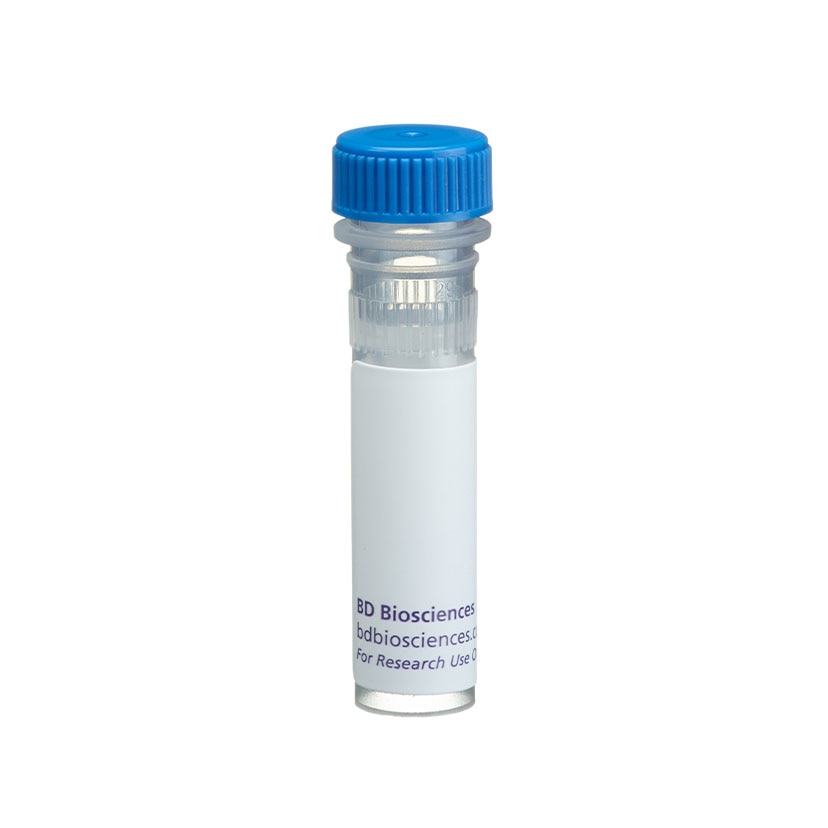-
Reagents
- Flow Cytometry Reagents
-
Western Blotting and Molecular Reagents
- Immunoassay Reagents
-
Single-Cell Multiomics Reagents
- BD® OMICS-Guard Sample Preservation Buffer
- BD® AbSeq Assay
- BD® Single-Cell Multiplexing Kit
- BD Rhapsody™ ATAC-Seq Assays
- BD Rhapsody™ Whole Transcriptome Analysis (WTA) Amplification Kit
- BD Rhapsody™ TCR/BCR Next Multiomic Assays
- BD Rhapsody™ Targeted mRNA Kits
- BD Rhapsody™ Accessory Kits
- BD® OMICS-One Protein Panels
- BD OMICS-One™ WTA Next Assay
-
Functional Assays
-
Microscopy and Imaging Reagents
-
Cell Preparation and Separation Reagents
Old Browser
This page has been recently translated and is available in French now.
Looks like you're visiting us from {countryName}.
Would you like to stay on the current location site or be switched to your location?
BD Pharmingen™ Purified Mouse anti-PLK1 (pT210)
Clone K50-483 (RUO)

Western blot analysis of PLK1 (pT210) in transformed human epithelioid carcinoma. Lysates from HeLa S3 cell line were probed with purified mouse anti-PLK1 (pT210) monoclonal antibody at concentrations of 0.063, 0.032, and 0.016 µg/ml (Lanes 1, 2, and 3, respectively) with (left panel) or without (right panel) lambda protein phosphatase treatment. PLK1 (pT210) is identified as a band of 68 kDa in the untreated cells.


Western blot analysis of PLK1 (pT210) in transformed human epithelioid carcinoma. Lysates from HeLa S3 cell line were probed with purified mouse anti-PLK1 (pT210) monoclonal antibody at concentrations of 0.063, 0.032, and 0.016 µg/ml (Lanes 1, 2, and 3, respectively) with (left panel) or without (right panel) lambda protein phosphatase treatment. PLK1 (pT210) is identified as a band of 68 kDa in the untreated cells.

Western blot analysis of PLK1 (pT210) in transformed human epithelioid carcinoma. Lysates from HeLa S3 cell line were probed with purified mouse anti-PLK1 (pT210) monoclonal antibody at concentrations of 0.063, 0.032, and 0.016 µg/ml (Lanes 1, 2, and 3, respectively) with (left panel) or without (right panel) lambda protein phosphatase treatment. PLK1 (pT210) is identified as a band of 68 kDa in the untreated cells.



Regulatory Status Legend
Any use of products other than the permitted use without the express written authorization of Becton, Dickinson and Company is strictly prohibited.
Preparation And Storage
Product Notices
- Caution: Sodium azide yields highly toxic hydrazoic acid under acidic conditions. Dilute azide compounds in running water before discarding to avoid accumulation of potentially explosive deposits in plumbing.
- Sodium azide is a reversible inhibitor of oxidative metabolism; therefore, antibody preparations containing this preservative agent must not be used in cell cultures nor injected into animals. Sodium azide may be removed by washing stained cells or plate-bound antibody or dialyzing soluble antibody in sodium azide-free buffer. Since endotoxin may also affect the results of functional studies, we recommend the NA/LE (No Azide/Low Endotoxin) antibody format, if available, for in vitro and in vivo use.
- Please refer to www.bdbiosciences.com/us/s/resources for technical protocols.
Polo-like kinase (PLK1) is a serine/threonine kinase with structural similarities to Drosophila's Polo kinase and the Cdc5p of Saccharomyces cerevisiae. Like its invertebrate counterparts, PLK1 activity is required for DNA synthesis and is regulated throughout the cell cycle. Furthermore, PLK1 is highly expressed in primary tumors. It associates with the mitotic spindle during mitosis suggesting that, in addition to its role during S phase, PLK1 may play a role during chromosome segregation. This is consistent with its potential role in cancer development. Threonine 210 (T210) is one of the major phoshorylation sites in activated PLK1 obtained from human mitotic cells.
The K50-483 monoclonal antibody recognizes the phosphorylated T210 of human PLK1.
Development References (4)
-
Ando K, Ozaki T, Yamamoto H, et al. Polo-like kinase 1 (Plk1) inhibits p53 function by physical interaction and phosphorylation. J Biol Chem. 2004; 279(24):25549-25561. (Biology).
-
Jang Y-J, Ma S, Terada Y, Erikson RL. Phosphorylation of threonine 210 and the role of serine 137 in the regulation of mammalian Polo-like kinase. J Biol Chem. 2002; 277(46):44115-44120. (Biology).
-
Peter B, Gleixner K, Cerny-Reiterer S, et al. Polo-like kinase-1 as a novel target in neoplastic mast cells: demonstration of growth-inhibitory effects of small interfering RNA and the polo-like kinase-1 targeting drug BI 2536. Haematologica. 2011; 96(5):672-680. (Clone-specific: Immunocytochemistry (cytospins)). View Reference
-
Yamashiro S, Yamakita Y, Totsukawa G, et al. Myosin phosphatase targeting subunit1 regulates mitosis by antagonizing polo-like kinase1. Dev Cell. 2008; 14(5):787-797. (Clone-specific: Immunofluorescence, Western blot). View Reference
Please refer to Support Documents for Quality Certificates
Global - Refer to manufacturer's instructions for use and related User Manuals and Technical data sheets before using this products as described
Comparisons, where applicable, are made against older BD Technology, manual methods or are general performance claims. Comparisons are not made against non-BD technologies, unless otherwise noted.
For Research Use Only. Not for use in diagnostic or therapeutic procedures.